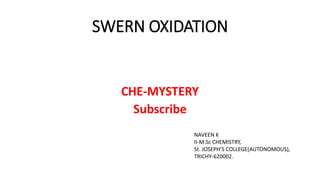
An electrified strategy for the traditional Swern oxidation reaction provides a contemporary method for converting primary and secondary alcohols into aldehydes and ketones at ambient temperature. In contrast to the conventional Swern oxidation, which necessitates dimethyl sulfide as a redox mediator under cryogenic conditions, this innovative technique achieves selective oxidation through an electrochemical approach. It facilitates scalability in flow circumstances, minimizing the threat of over-oxidation and eliminating hazardous reagents.
The idea emerged when Simon Kaltenberge, a visiting PhD student in Kevin Lam’s group at the University of Greenwich, UK, observed parallels in crucial intermediates between the Swern mechanism and electrochemical approaches. Established oxidation techniques such as chromium(VI) reagents and Dess–Martin periodinane, similar to Swern, typically demand low temperatures and pose sensitivity and scalability difficulties. Lam and his team have addressed these issues by employing anodic oxidation within an undivided cell, effectively generating an oxidizing agent from a thioether using its radical cation form. This technique yields favorable outcomes and demonstrates extensive functional tolerance.
The modular nature of this reaction is a notable benefit, enabling the choice of mediators tailored to specific results. This grants users the ability to opt for straightforward thioethers for simpler purification methods or safer, less volatile alternatives.
Presently, the research team is focused on extending this method beyond laboratory environments. Connall Molloy, a PhD student in Lam’s group, is poised to investigate its use at an industrial level at GSK. Concurrently, Siegfried R. Waldvogel, director at the Max Planck Institute for Chemical Energy Conversion, highlights the industrial challenges, particularly concerning downstream processing and the recycling of electrolyte systems. Flow chemistry presents a promising resolution by negating the necessity for an electrolyte system, thus bypassing the over-oxidation issues prevalent in batch processes.
Mahito Atobe, an expert in electrosynthesis, views this endeavor as a revolutionary and sustainable synthetic technique applicable in both laboratory and industrial contexts. Waldvogel commends the innovative essence of evolving modern solutions inspired by historical literature, resulting in inventive progress in chemical methodologies.